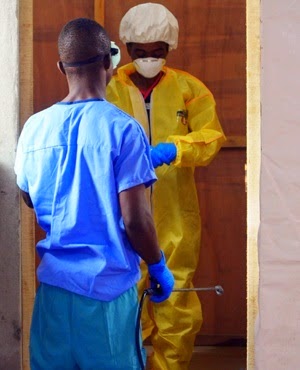Guinea residents 'refusing' Ebola treatment
Residents of the Guinean capital Conakry, hit hard by Ebola, say they are afraid to seek treatment at hospitals for fear of being poisoned by doctors, as the death toll across West Africa passed the 3,000 mark.
Local resident Tairu Diallo said on Friday that people living in his neighbourhood refused to seek medical help and instead stayed at home, trying to alleviate their symptoms with drugs bought at a pharmacy.
Diallo said people think doctors at hospitals inject patients with a deadly poison.
"If we have a stomach ache we don't go to hospital because doctors there will inject you and you will die," he said.
Many Guineans say local and foreign healthcare workers are part of a conspiracy which either deliberately introduced the outbreak, or invented it as a means of luring Africans to clinics to harvest their blood and organs.
Earlier in September, eight people, including journalists and Ebola-related educators, were killed in southeastern Guinea.
The World Health Organisation (WHO) said on Friday that the death toll in West Africa has risen to at least 3,091 out of 6,574 probable, suspected and confirmed cases.
Liberia has recorded 1,830 deaths, around three times as many as in either Guinea or Sierra Leone, the two other most
affected countries, according to WHO data received up to September 23.
An outbreak that began in a remote corner of Guinea has taken hold of much of neighbouring Liberia and Sierra Leone,
prompting warnings that tens of thousands of people may die from the worst outbreak of the disease on record.
The WHO said Liberia had reported six confirmed cases of Ebola and four deaths in the Grand Cru district, which is near the border with Ivory Coast and had not previously recorded any cases of Ebola. Liberia's chief medical officer, Bernice Dahn, said that she is placing herself under quarantine for 21 days after her office assistant died of Ebola. Dahn, who has represented Liberia at regional conferences intended to combat the ongoing epidemic, told the Associated Press on Saturday that she did not have any Ebola symptoms but wanted to ensure she was not infected.
Ivory Coast President Alassane Ouattara said on Friday that his country will lift the controversial suspension of flights to countries affected by the Ebola virus. He said there was no longer a reason to restrict air travel.
There are no reported cases of Ebola in Ivory Coast.
Nigeria and Senegal, the two other nations that have had confirmed cases of Ebola in the region, have not recorded any new cases or deaths in the last few weeks

Comments
Post a Comment